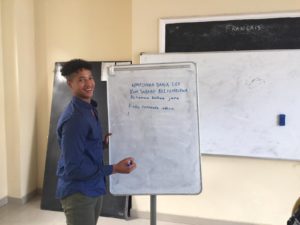
Kiswahili class at The Institute of Kiswahili and Foreign Languages at SUZA.
Language and culture are inextricably linked. Language is a way to communicate as well as a window into the soul of a culture. Learning Kiswahili is more than a social entrée or tool for research, it is the key to understanding worldview, the nature of social relationships, and the organization of society. With these thoughts in mind, I have really dedicated myself to advancing my Kiswahili here in Zanzibar, both in and out of the classroom. In my previous blog I talked about slang, so here I’ll talk about my formal classroom learning of Kiswahili at Taasisi ya Kiswahili na Lugha za Kigeni (The Institute of Kiswahili and Foreign Languages) at the University of Zanzibar (SUZA) based in Stone Town.
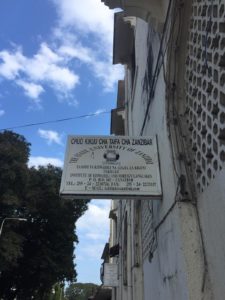
Sign for The Institute of Kiswahili and Foreign Languages at SUZA. Photo: Nyakeh Tuchscherer
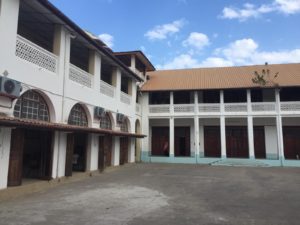
The Institute at SUZA. Photo: Nyakeh Tuchscherer
Monday through Friday, from 8:30 to 12:30, I learn Kiswahili at SUZA. The class is led by our professor, Mwalimu Jecha (‘Mwalimu’ meaning ‘teacher’). The class has been small, with two other students who are graduate students from the University of Kansas, along with a mature student who works for a Canadian NGO. We are all serious learners, but Kiswahili (or any language) is challenging to learn. We do a lot to help each other and Mwalimu Jecha has a lot of patience and determination as he drills us over and over again until we get things right.
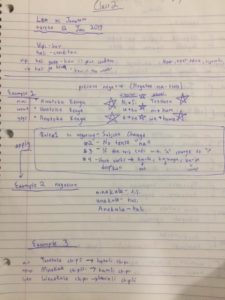
Random page of from my Kiswahili notes. Photo: Nyakeh Tuchscherer
After spending weeks learning how to conjugate verbs and utilizing all tenses of the Kiswahili language, we began to speak amongst each other in Kiswahili. One of our first exercises was to share with each other sentences in Kiswahili that we regularly heard and used. From there we advanced to dialogue practice in role-play, learning how to navigate our way through common situations ranging from the home to the marketplace. For example, some of the dialogue that I focused on concerned purchasing goods, communicating where I was in the process of going, or reporting on activities I have been engaged in. For example, ‘Nina kukata nywele zangu’ translates to ‘I have my hair cut’ which I did yesterday!
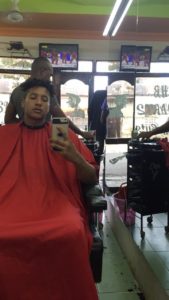
Before. Photo: Nyakeh Tuchscherer
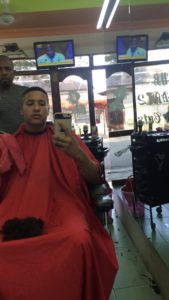
After. Photo: Nyakeh Tuchscherer
The most efficient way, I’ve found, to become a better speaker of a language is through constant repetition. Repeated use of important verbs and trying to get tenses perfect comes through such repetition. Paying close attention to singular and plural as well. With constant drilling and dialogue in class – repeating and exchanging utterances to exhaustion – our memories lock in. The words just start to come out. In this way, simple Kiswahili has become second nature. The result as that everyone in the class is launched out into the world of Zanzibar at 12:30 when class ends for the day, at which time we are able to have understandable and even meaningful conversations with Kiswahili speakers. I have found that an ability to speak Kiswahili, or even the act of trying to speak the language, is embraced by the entire community of Zanzibar. Kiswahili speakers love their language and trying to speak it shows a reciprocal love for the community.
My Kiswahili speaking has improved dramatically in the short time I’ve been here. The combination of formal learning in the mornings followed by immersion in the culture and a myriad of language situations in the afternoons and on the weekends, has been a great fit for my learning style. It helps a lot that I have an excellent and dedicated teacher such as Mwalimu Jecha and that I share the class with other students who are as zealous as I am about learning Kiswahili. As time goes on, with every passing day, my speaking has become more fluid and the range of ideas I can express in the language increases. As readers who know me will know, I see my summer Kiswahili language as a true gift as my future goal is to conduct research in other parts of East Africa where Kiswahili is spoken.